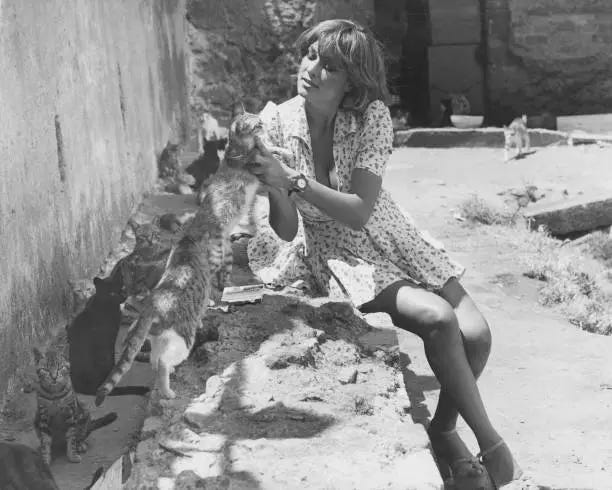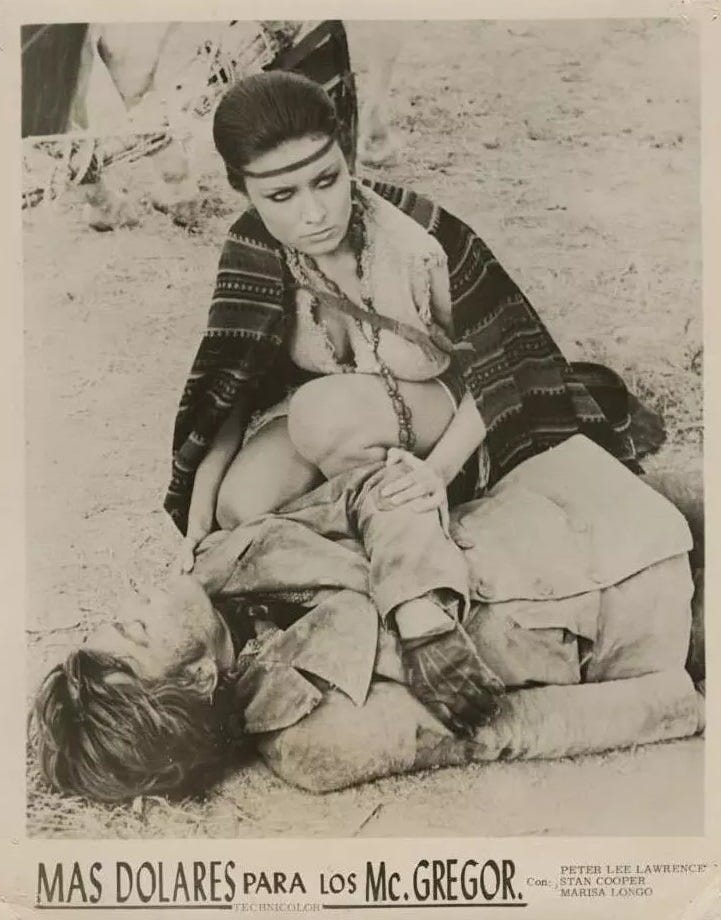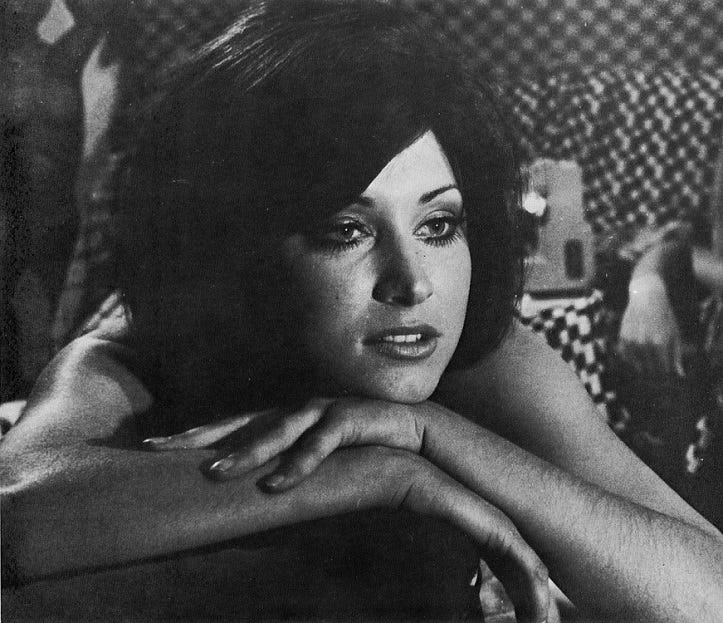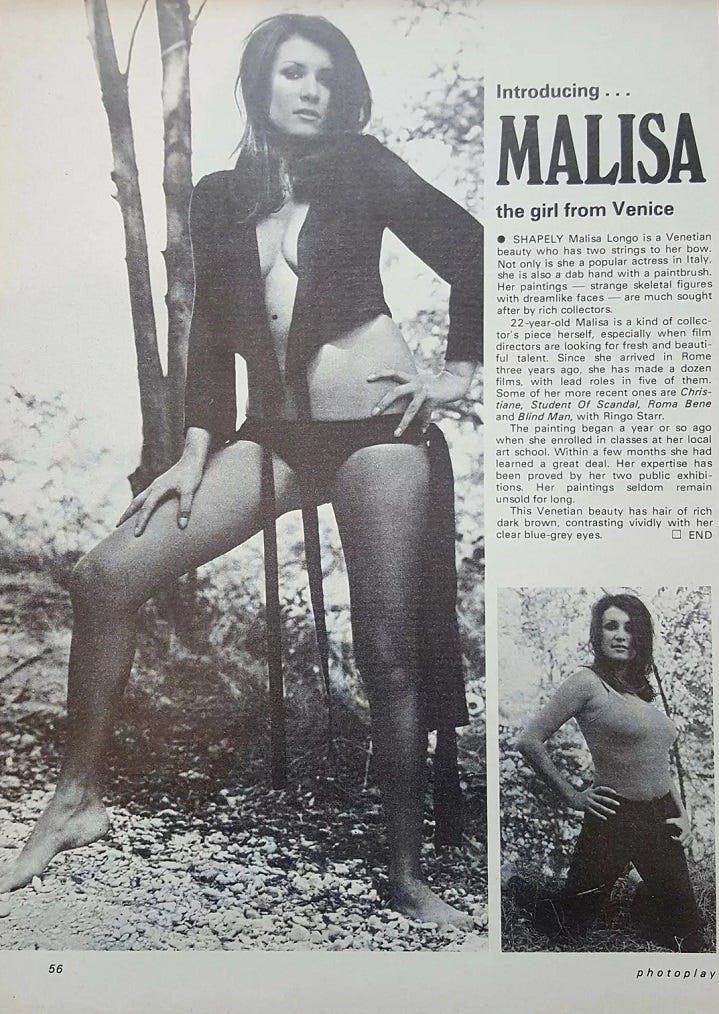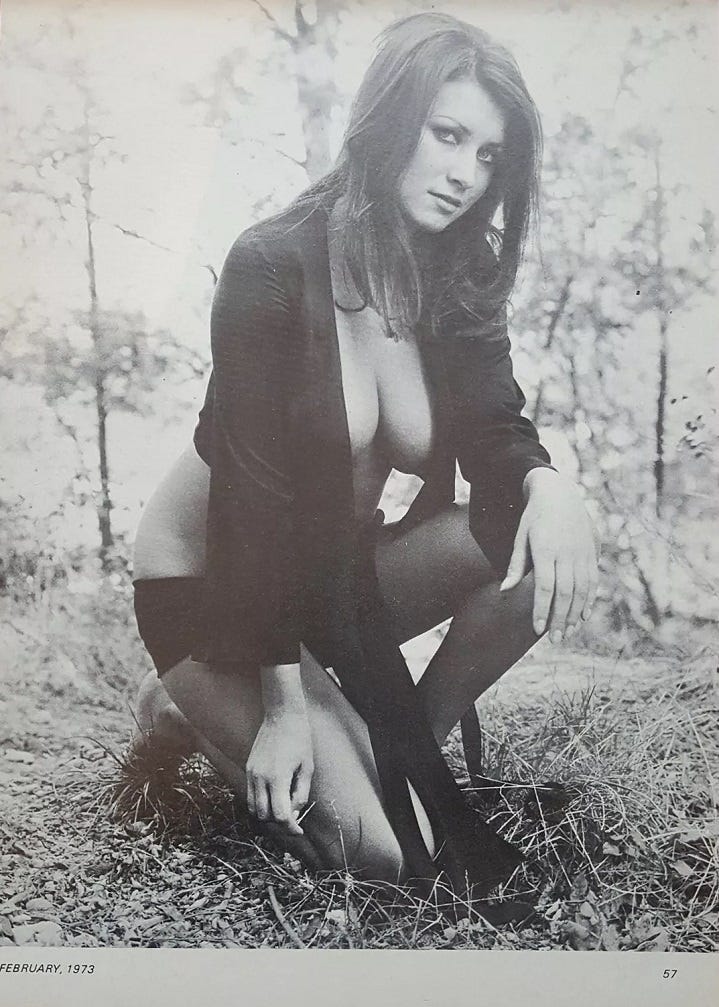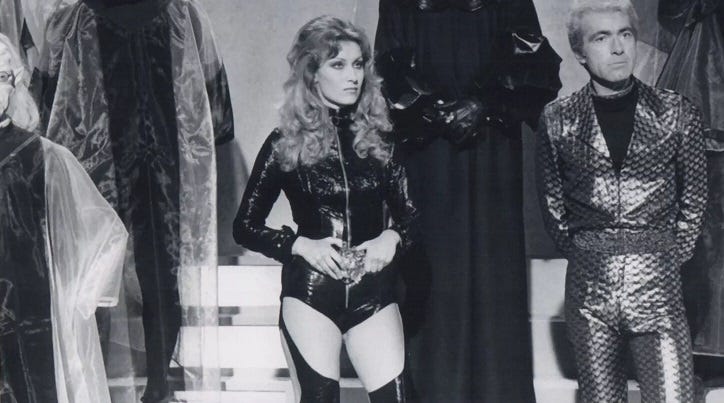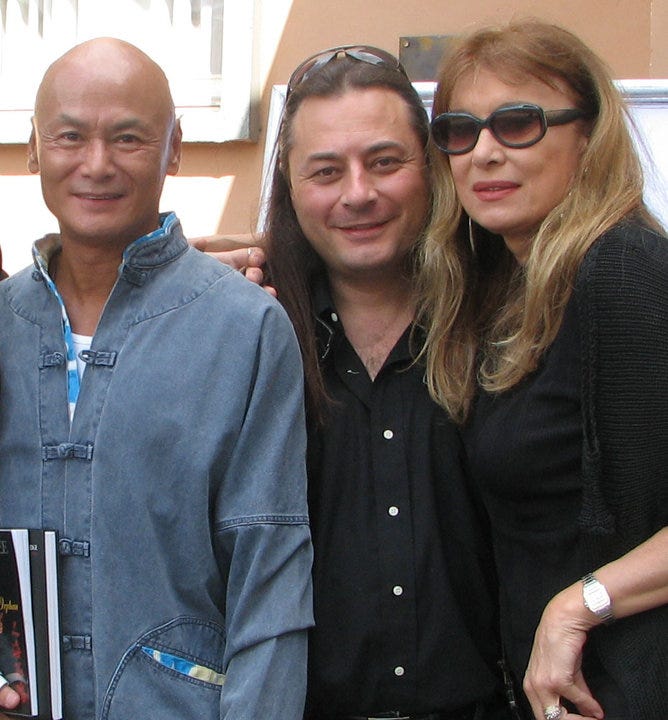Translation: That’s the life of Longo. There is an Italian actress whose stage name is Malisa Longo, but her real name is Maria Luisa Longo. In the late nineties, she wrote a novel titled Così Come Sono. The English title is Just As I Am. It was published in 2000 - the year that she turned 50. Given the nature of her filmography, it’s easy to perceive her book as autobiographical as she typed: “This book contains a true story about the erotic life of an Italian movie star. However, the name of characters have been changed, and artistic license has been taken with certain situation.”
Tinto Brass, the director of Caligula (1979) wrote the preface. I won’t include all of it, just the first third: “I feel like I've always known Malisa Longo. Not only because I directed her in three films – Salon Kitty, Miranda and Snack Bar Budapest – but also because of our shared Venetian background, which creates a kind of “organic feeling” between us, allowing us to understand each other immediately. It's like a picklock that permits one to break open the casket of personal libido, a skeleton key to gain access to the strongbox of our darkest, unmentionable secrets. Those secrets which, allowed to settle with time and disenchanted with a touch of irony, constitute the essence of the book she has written.”
I don’t want to give away any surprises as to what her writing is like, so I will just concentrate on making observations. There are ten chapters: Prologue, I Want to Be an Actress, Marco, Summertime, First Love, Sex on the Clouds, Erotic Dreams, Lost in the Hell, I Need You and Epilogue.
Instead of beginning the novel with an Italian proverb, she uses a German one from Martin Heidegger: “Being is the nearest yet the near remains farthest from the human being.”
Chapter 1 begins in Hong Kong, which is interesting because Malisa’s film career was well underway way before she was cast in Bruce Lee’s The Way of the Dragon in May 1972. It’s significant because Malisa didn’t do any filming in Hong Kong.
Chapter 2: Even though names are supposed to be changed, Malisa clearly didn't think twice about changing the name of Marcello Mastroianni. This is because he was the one who discovered her. Ironically, they worked together much later in 1979 for Federico Fellini’s City of Women. Let’s get back to chapter 2. When Malisa finally moves to Rome, she is overwhelmed by the amount of cocaine in the nightlife. Since her female room-mate is an addict, Malisa ends up snorting some cocaine. To avoid being too addicted for her own good, Malisa moves out.
Knowing what I know about Bruce Lee’s cocaine addiction, he was bound to have been subjected to the substance while filming The Way of the Dragon in Rome. As soon as he came back to Hong Kong, he got his wife (Linda) to send a letter to an American friend where cocaine was requested.
Chapter 3: The first person who Malisa kissed was her female best friend in middle school. They would always kiss when re-enacting love scenes from movies.
Chapter 4: Malisa is still a virgin by the time that she is 18 but then loses it at that age. It isn’t a particularly romantic encounter as her male lover is too forceful. We learn that Laura is the name that Malisa has given her character. I should also note that the book is entirely written in first person, which makes it obvious that this is a memoir of sorts.
Chapter 5: After having sex with two other boys, Malisa thinks that she is pregnant until a doctor tells her that she has a simple case of amenorrhea. She is prescribed some pills for her Candida, along with some birth control pills.
Chapter 6: On a plane to Hong Kong, she is seated next to a nuclear engineer who is using a laptop. The way that Malisa plays with time as a writer makes me think that she wants Hong Kong to be seen as significant. When Annabel Schofield later wrote an autobiographical novel as well, another erotic tale, she did the same thing.
Chapter 7: Malisa has just finished shooting a “major movie that was definitely going to be entered in the Cannes Film Festival.” One could presume that this is Miranda, which is basically the Italian equivalent to a Merchant Ivory film with a lot of sex thrown in. With it being directed by Tinto Brass, this raises the question why she wasn’t cast in Caligula. That was a film which suited her sexpot reputation. Anyway, the chapter ends with Malisa asking the stewardess when they will be arriving in Hong Kong.
Chapter 8: “Giorgio” is Malisa’s husband - Ricardo Billi (i.e. the fat banker who we see in The Way of the Dragon). Apparently, he was the reason why she agreed to be in Supermen Against the Amazons (1975). This was a collaboration between an Italian company called A Erre Cinematografica and a Hong Kong company called Shaw Brothers. If her novel is anything to go by, it would appear that Malisa had an affair with a rich European during the making of the film. He wasn’t someone who worked on the film; just a tourist.
Chapter 9: If someone asks for her autograph during filming but they don’t know who she is, she will sign under different names - either Meryl Streep, Jessica Lange or Kim Basinger.
Chapter 10: Riccardo has sex with Malisa in Hong Kong.
Instead of ending the novel with a Chinese proverb, she uses an Italian one from Mario Luzi: “Go search in the opaque depths of love where he lost his train of thought.”
That bald guy in the below photo is a Shaw Brothers movie star named Gordon Liu. He wasn’t even in Supermen Against the Amazons. The man pictured in between them is Lorenzo De Luca. They were not in Hong Kong, but Rome. They were at a film studio called Cinecittà. The photo was taken in 2007 for the premiere of Lorenzo’s very long documentary, which is known in shorthand as Dragonland but is known in long-form as Dragonland: L'urlo di Chen Terrorizza Ancora L'occidente. The subtitle translates to Chen's Cry Still Terrorizes the West. This is a variation of the Italian title for Bruce Lee’s The Way of the Dragon.
From a 1999 book titled 99 Donne: Stelle e Stelline del Cinema Italiano (i.e. 99 Women: Stars and Starlets of Italian Cinema), Malisa Longo was quoted as saying: “Bruce asked my husband to co-produce three other low-budget movies, the cost being only forty million liras each, but my husband refused – 'Who the Hell is this little ugly Chinese...?' Therefore, Bruce Lee did only this film in Italy, went back to HK, and three months later he was a superstar. If only Riccardo accepted, I'd be a billionaire now!”
In 2019, Antonello Altmura conducted an interview with her for an Italian magazine called Lost & Found. The interview was preserved on a Google blog about spaghetti Westerns. When asked if Bruce Lee was kind to her, she said: “Yes, very gallant, and a real man. You know, I did not expect that this Chinese, who had however a beautiful body, had such a worldwide resonance over the years. I wonder if he had not died so young if this legend would have even started. He then had a philosophy of his own. He was a strict, healthy man, and his son's death seemed strange to me, I must say. I have my hypotheses...”





